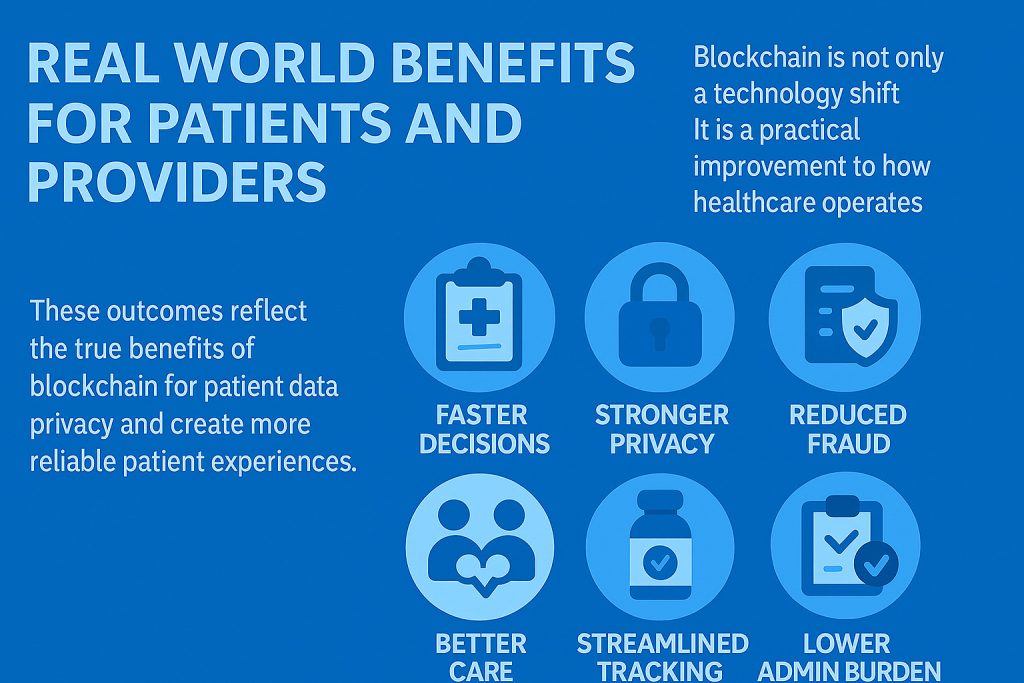Healthcare organizations have more data than ever, yet the systems that hold this information often remain fragmented and insecure. Medical records sit in isolated databases, and every provider protects their own version of a patient’s health story. This slows down treatment, limits collaboration, and raises privacy concerns.
The need for safe and frictionless data movement is stronger today than at any point in modern healthcare. This is why blockchain in healthcare data sharing is gaining attention. Blockchain is reshaping how organizations exchange information, improving trust, transparency, and patient control. Blockchain technology in healthcare organizations can exchange data with greater trust, transparency, and patient control.
The Problem with Today’s Healthcare Data Landscape
Despite its promise, blockchain adoption faces notable challenges. Scalability remains a critical concern, as healthcare generates high-volume, high-velocity data that current blockchain networks struggle to process efficiently.
Regulatory compliance adds complexity, as frameworks like HIPAA and GDPR demand strict oversight of sensitive data, a difficult fit for decentralized architectures. Additionally, integrating blockchain with legacy healthcare systems requires significant investment, technical alignment, and organizational readiness.

Key challenges include:
- Siloed electronic systems across hospitals and clinics
- Outdated security frameworks that struggle to protect sensitive records
- Duplicate versions of patient histories across different providers
- Minimal patients say in how their data is accessed or shared
- High administrative time spent reconciling inconsistent data
These limitations make collaboration challenging and slow down medical decision-making. They also spark a larger conversation around privacy, which is why organizations are looking to blockchain technology in healthcare as a long-term solution.
What Blockchain Brings to Healthcare Data
One of the most promising uses of blockchain lies in Electronic Health Records (EHRs). A blockchain-enabled EHR system ensures that patient information remains consistent, tamper-proof, and accessible to authorized providers. Patients can manage consent dynamically, improving care coordination, a major step forward for blockchain for patient data security and transparent clinical workflows.
Blockchain also enhances prescription management, reducing fraud by preventing unauthorized alteration of prescription data. Patients and clinicians gain real-time visibility into medication histories, improving adherence and safety.
In clinical research, blockchain ensures transparent, immutable trial data. Researchers can securely share verified datasets across institutions, accelerating discovery and fostering global collaboration.
Key Use Cases of Blockchain in Healthcare
Blockchain is not just theoretical in healthcare; several practical applications are already gaining traction. Some of the most promising use cases:
1. Unified Patient Records & Cross-Provider Data Sharing
By storing or indexing patient data on a distributed ledger, blockchain enables a unified and up-to-date view of a patient’s history across multiple care providers, labs, insurers, and even across countries. This is particularly valuable when a patient changes providers or travels internationally.
Blockchain-based record systems allow authorized providers to securely access relevant information, strengthening patient data privacy blockchain protections.
Secure Data Sharing Without Borders
One of the biggest advantages of blockchain is its ability to connect healthcare systems across regions, countries, and platforms. It removes geographic and technical limitations by creating a unified architecture that any authorized participant can trust.
Why this matters:
- Clinicians can access complete patient records regardless of where the person lives or travels
- Researchers can collaborate with global datasets while protecting confidentiality
- Emergency teams gain immediate access to life-saving information
- Virtual care providers can rely on accurate, verified health histories
Blockchain enables true blockchain interoperability in healthcare. Through a decentralized healthcare data exchange, hospitals and partners can exchange information in real time while preserving privacy and security.
This is a major milestone for blockchain for electronic health records (EHR) and is shaping new models of decentralized health information exchange blockchain networks.
Real World Benefits for Patients and Providers
Blockchain is not only a technology shift. It is a practical improvement to how healthcare operates every day.

Key benefits include:
- Faster clinical decision making through consistent, unified patient data
- Stronger privacy using patient data privacy blockchain protections
- Reduced fraud, since records cannot be tampered with
- Better chronic care coordination across multiple providers
- Streamlined pharmaceutical tracking to prevent counterfeit products
- Lower administrative burden through automated verification
These outcomes reflect the true benefits of blockchain for patient data security and create more reliable patient experiences.
Compliance and Trust Through Blockchain
Healthcare organisations must follow strict regulations that protect patient confidentiality. Blockchain helps simplify compliance through strong access control and transparent record keeping.
Many HIPAA compliant blockchain healthcare solutions now combine decentralised storage, encryption, and smart contracts to meet both security and regulatory requirements.
Blockchain strengthens compliance by:
- Limiting unauthorized access to protected health information
- Creating permanent, verifiable logs
- Maintaining consistent security across distributed systems
- Reducing the risk of data breaches during data exchange
This provides a strong foundation for trust across healthcare ecosystems.
The Future of Healthcare Data Sharing
Future research will focus on enhancing blockchain scalability through off-chain solutions and sidechains. Clear regulatory frameworks are needed to guide compliant deployment. Establishing common interoperability standards will ultimately enable seamless, secure data exchange across healthcare ecosystems.
As innovation continues, blockchain is poised to become a cornerstone of secure, patient-centered healthcare data management.
What the future holds:
- Seamless collaboration across global care networks
- Portable digital health identities for patients
- More accurate diagnostics through unified datasets
- Broader research capabilities with secure data contribution
- AI-infused analytics that run on trusted, verified information
The future of blockchain in healthcare data sharing points to a world where healthcare is more connected, more accurate, and far more patient centred.
Key Takeaways
Blockchain is reshaping how healthcare organisations protect, access, and share data. With stronger privacy controls, improved interoperability, and decentralized architectures, blockchain is building a more secure and patient centered future.
Healthcare providers that embrace this shift are better positioned to collaborate, innovate, and deliver higher-quality care with confidence. If your organisation is exploring blockchain in healthcare data sharing, blockchain for patient data security, blockchain interoperability in healthcare, or patient data privacy blockchain, Prolifics can guide you every step of the way.
Our experts help you identify the right use cases, design secure architectures, and implement scalable blockchain solutions that deliver real business value.
Connect with Prolifics today and start building your next-generation healthcare data strategy.




